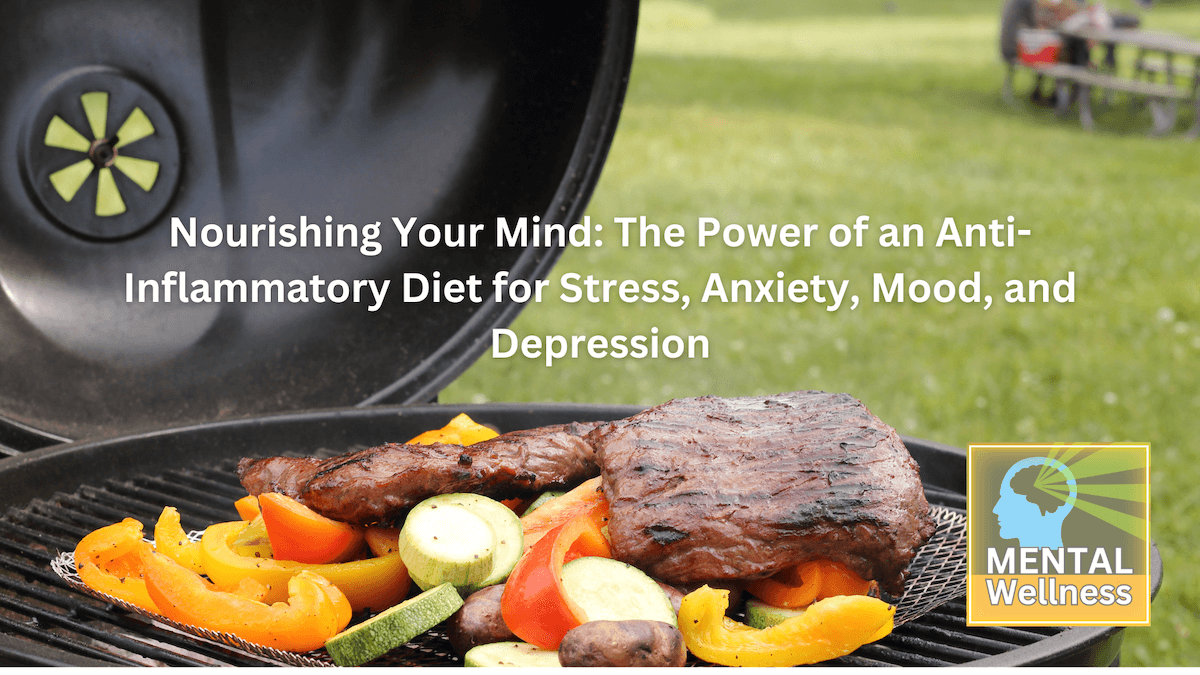Nourishing Your Mind: The Power of an Anti-Inflammatory Diet for Stress, Anxiety, Mood, and Depression
In the quest for better mental health, it’s easy to overlook the significant role that diet plays in our emotional well-being. While traditional treatments like therapy and medication are essential, adopting an anti-inflammatory diet can be a game-changer when it comes to managing stress, anxiety, mood disorders, and depression. As holistic medical practitioners, we’re excited to delve into the science behind how the foods we eat can profoundly impact our mental health and provide guidance on harnessing the power of an anti-inflammatory diet.
Understanding Inflammation’s Role in Mental Health
Before we explore the connection between diet and mental health, let’s briefly examine inflammation’s role in the body. Inflammation is a natural immune response to injury or infection, but when it becomes chronic, it can lead to a host of health problems, including mental health issues. Chronic inflammation has been linked to the development and exacerbation of stress, anxiety, mood disorders, and depression. It affects the brain and nervous system, leading to imbalances in neurotransmitters and promoting oxidative stress—both of which can contribute to these mental health challenges.
The Anti-Inflammatory Diet Approach
An anti-inflammatory diet focuses on foods that help reduce chronic inflammation in the body. By choosing the right nutrients and avoiding pro-inflammatory foods, you can positively influence your mental health. Here are ways in which an anti-inflammatory diet can benefit your emotional well-being:
- Balancing Omega-3 and Omega-6 Fatty Acids: Chronic inflammation is often associated with an imbalance of omega-3 and omega-6 fatty acids. Omega-3 fatty acids, found in fatty fish like salmon, walnuts, and flaxseeds, have anti-inflammatory properties and can help reduce inflammation in the brain, potentially alleviating symptoms of depression and anxiety.
- Boosting Antioxidants: Colorful fruits and vegetables, such as berries, leafy greens, and peppers, are rich in antioxidants like vitamins C and E. These antioxidants combat oxidative stress, which can contribute to mood disorders.
- The Gut-Brain Connection: Emerging research shows a strong connection between the gut and the brain. An anti-inflammatory diet, which includes fiber-rich foods like whole grains, legumes, and fermented foods, can foster a healthy gut microbiome. A balanced gut microbiome is crucial for optimal mental health, as it influences neurotransmitter production and regulation.
- Reducing Sugar and Processed Foods: Sugar and highly processed foods can trigger inflammation. By minimizing your consumption of these items, you can help stabilize your mood and energy levels, reducing the risk of mood swings and depressive episodes.
- Mindful Eating: Practicing mindfulness during meals can reduce stress and anxiety. Savoring each bite, chewing slowly, and being present while eating can help regulate cortisol levels—the hormone associated with stress.
- Hydration: Dehydration can contribute to increased stress and anxiety. Staying well-hydrated with water, herbal teas, and hydrating foods can support overall well-being.
The Role of Specific Nutrients
Certain nutrients found in an anti-inflammatory diet can have a direct impact on mental health:
- Vitamin D: Adequate vitamin D levels have been linked to a lower risk of depression. Include vitamin D-rich foods like fatty fish, fortified dairy products, or consider a supplement if needed.
- B Vitamins: B vitamins, especially folate (B9) and B12, are crucial for mood regulation. Leafy greens, beans, and lean meats are excellent sources.
- Magnesium: This mineral is involved in neurotransmitter production and muscle relaxation. Incorporate magnesium-rich foods like nuts, seeds, and dark chocolate into your diet.
- Probiotics: Probiotic-rich foods like yogurt, kefir, and sauerkraut support gut health, which in turn can influence mood and mental well-being.
An anti-inflammatory diet is not just about physical health; it’s a powerful tool for nurturing your mental well-being. By choosing foods that reduce inflammation, support a healthy gut, and provide essential nutrients, you can take significant steps towards managing stress, anxiety, mood disorders, and depression naturally. Remember, the journey to better mental health starts with the choices you make at the dinner table.
If you or someone you love would benefit from anti-inflammatory nutrition support or advice on supplementation,

